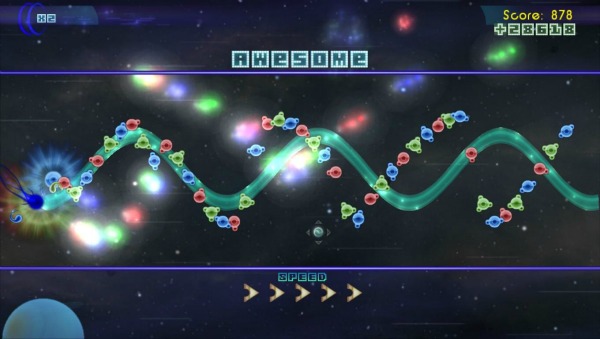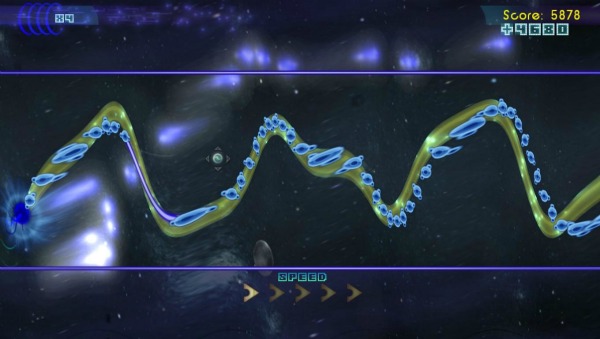 When video game programmer and designer Ryan Vandendyck set out to start a new project in the summer of 2009, the idea was simple: create a game centered on a single game play mechanic inspired by mathematical principle. The result was Waveform, a colorful, retro-style action game that tasks you with restoring light to a dying galaxy by manipulating a wave of light transmitting through space.
When video game programmer and designer Ryan Vandendyck set out to start a new project in the summer of 2009, the idea was simple: create a game centered on a single game play mechanic inspired by mathematical principle. The result was Waveform, a colorful, retro-style action game that tasks you with restoring light to a dying galaxy by manipulating a wave of light transmitting through space.
Originality and innovation aren’t easy to find among the blockbuster video games these days, but they’re the backbone of independent games created by small indie developers like Vandendyck. The indie game developers are the ones coming up with surprise hits like Minecraft, which has sold millions of copies.
Impressed by the minimalism of indie games Auditorium and Art Style: Orbient, Vandendyck says he came up with the idea for Waveform while doodling in a notebook and created a prototype in about three evenings after work. “I know it’s kind of a funny idea to base a game on, but after those three evenings I had something on my hands that was pretty fun, even in its basic form,” he said.
If you’re a child of the 80’s, Waveform might evoke some feelings of nostalgia. Everything from the scorecards to the soundtrack to the dot matrix font has a retro feel to it. The controls are deceptively simple; clicking and dragging your mouse left or right lengthens or shortens the traveling sine wave, while up and down movements change its amplitude. This allows you to line it up with objectives and avoid obstacles like black holes and space squids (yes, space squids) along the way. But the nearly 100 levels get trickier as you go along and I actually found myself stumped by a particular level. Let’s just say I’ll never look at an event horizon the same way again.
If you’re looking for re-playability, developer Eden Industries says you’ll be able to track achievements and leaderboards via Valve’s Steam Community, while an in-game editor will allow you to create and share your own levels with others.
 Although Waveform is currently being developed only on Steam, the simplistic control scheme seems perfect for mobile devices, and Vandendyck does hope to release it on other platforms in the future. Eden Industries recently launched a Kickstarter campaign to raise money so it could port the game to other platforms, including iOS, Android, Mac, and Linux, but fell short of its goal. However, Vandendyck says he is not discouraged. “If the Kickstarter [campaign] was successful, it would’ve allowed me to get working on those ports immediately,” he said. “Now, however, I’ll have to wait for the PC release of the game to earn some revenue, which I can direct into developing those ports.”
Although Waveform is currently being developed only on Steam, the simplistic control scheme seems perfect for mobile devices, and Vandendyck does hope to release it on other platforms in the future. Eden Industries recently launched a Kickstarter campaign to raise money so it could port the game to other platforms, including iOS, Android, Mac, and Linux, but fell short of its goal. However, Vandendyck says he is not discouraged. “If the Kickstarter [campaign] was successful, it would’ve allowed me to get working on those ports immediately,” he said. “Now, however, I’ll have to wait for the PC release of the game to earn some revenue, which I can direct into developing those ports.”
One would think a game based on a mathematical principle would be a turn-off to some players, but Vandendyck says he’s not worried. “Since it doesn’t require any mathematical ability to play, and in fact never references any math at all, the only thing people will see is the fun game play and unique experience,” he said. “When you consider that a game like Angry Birds is based on a 2D physics simulation but is still of course a ton of fun and super popular, I think it’s fair to say that the only thing that wouldn’t go over well with some gamers is if they’d have to do math to play it, not if the underlying idea is based on math.”
Waveform will be released sometime in February. A price has not been set at this time, but should be similar to other indie titles offered through Steam.
VentureBeat's mission is to be a digital town square for technical decision-makers to gain knowledge about transformative enterprise technology and transact. Learn More
